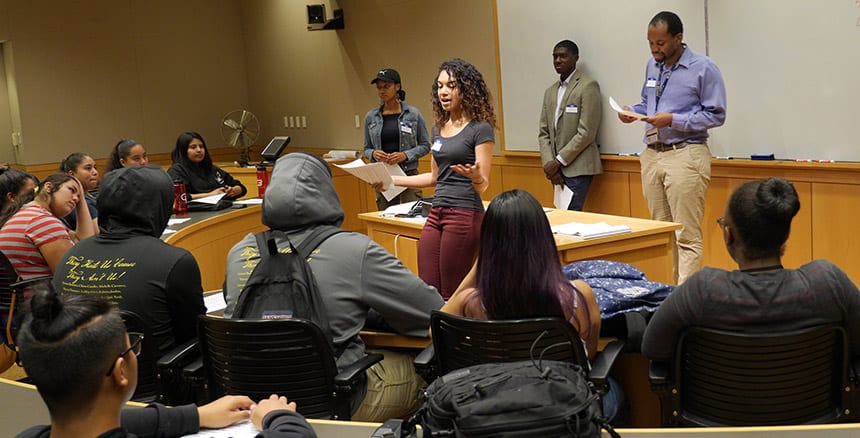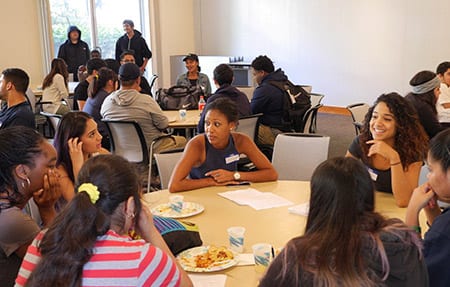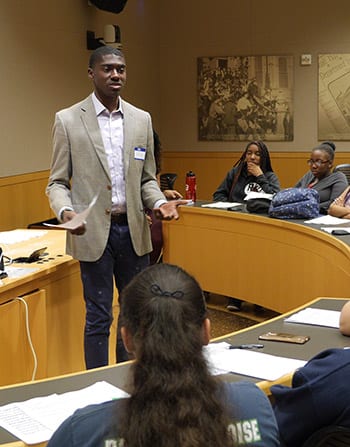
By Andrew Cohen
For one afternoon anyway, Berkeley Law’s students became the teachers. Sharing empowering legal knowledge as well as personal insights, about a dozen of them hosted 33 students from Oakland Fremont High School’s Mandela Law & Public Service Academy.
The Berkeley Law students included members of the school’s First Generation Professionals (FGP) and Law Students of African Descent. After talking with the visiting contingent over lunch, eight teamed up to present simultaneous classroom sessions—one on the 4th Amendment and the other on current immigration law issues.
“In addition to providing some practical information, we wanted to make sure these high school students came away with a better understanding of the path to college and law school and all the things you can do with a law degree,” said FGP Co-director Jessica Hollis ’18.
Last summer, Hollis coordinated a mentoring event and co-hosted a workshop for the Center for Youth Development Through Law’s summer program at the law school. The program benefited 37 disadvantaged area high school students who worked as paid interns for law offices, nonprofits, government departments and elected officials; and attended classes at Berkeley Law that integrated a legal curriculum with life skills and leadership development activities.
So, when the center’s executive director Nancy Schiff inquired about a fall visit from other high school students interested in the law—all youth of color from disadvantaged neighborhoods in Oakland—Hollis leapt at the chance.

“For kids who may be the first in their families to finish high school or pursue higher education, it’s important to give them information, guidance and confidence that will help them take the next step,” Hollis said. Schiff agreed, adding that she and Hollis “wanted these students to know that the challenges they face can be overcome, and that mentors are available to support them on their path.”
For the high school delegation, talking with law students who look like them—and in some cases come from similar backgrounds—proved both insightful and inspirational.
“It was surprising … because I always wonder where inspiration comes from when there’s nobody in front of you to model,” said junior Cameron Fontenette, who took an unpaid internship in 7th grade with a lawyer in Alameda. Fontenette noted that the immigration session—taught by Hollis, Alice Chi ’18, David Giron ’19 and Drew Washington ’19—“kept us engaged.” He was also intrigued to learn how “there were so many ways for people to come to our country and that sometimes they can’t stay.”
Street smarts
Alexus Payton ’17, Travis Mitchell ’19, Cheyenne Overall ’19 and Maalik Nickerson ’19 taught the “Know your Rights” session. Payton described what police behavior constitutes both “search” and “seizure” under the 4th Amendment, and the different levels of protection afforded one’s purse, car, house and body. She also noted that evidence obtained without reasonable suspicion cannot not be used.
The session also discussed the two levels of interaction with police that stem from suspected criminal activity—reasonable suspicion to stop someone and probable cause to detain—as well as the beyond a reasonable doubt standard required to convict. Mitchell explained how reasonable suspicion must be based on objective criteria that is “more than a guess,” how probable cause is “harder to find because it requires concrete evidence,” and that beyond a reasonable doubt must be “nearly a 100 percent certainty.”

Overall talked about stop and frisk, which is available to police—where the practice is legal—upon finding reasonable suspicion of criminal activity. “The notion of ‘reasonable’ can be a problem,” she said. “Especially when it’s up to the individual police officer to decide in that moment. A lot of our rights are determined by judges’ interpretations of what’s reasonable, and those interpretations are formed by their experience.”
Nickerson implored the high school students to know their rights and “remain calm” if stopped by police. “Showing frustration and an attitude is the wrong road to go down,” he said. “Never lie. If you feel you’re being mistreated, make a mental note of the officer’s three-digit badge number, and you can call the department later. Ask, ‘Am I being detained?’ because the officer must give an answer. But always be polite.”
Mitchell, who grew up wanting to be a lawyer “but had no real access to lawyers or people who knew the process,” thought the event removed some “law school mystique” for the visitors. “The chance to connect with young people—especially local students of color—around something they care about and is useful to them was a great way to remind myself of my own goals and why I’m here,” Mitchell said. “More importantly, I think the kids left with some new knowledge and we were all able to have fun.”
For Mandela Law & Public Service Academy Director Patricia Arabia, the outing was a reminder that seeing is believing.
“Talking with the law students and eating together builds a sense in our students that college could be in their future,” she said. “The fact that they share race and culture is a huge benefit because our students don’t see people who look like them among their high school teachers or administrators. … Every one of our students was engaged, and I know from past experience it’s because students close to their age have much more credibility. These particular law students were clearly culturally aware; I appreciated their manner and respect for our students.”